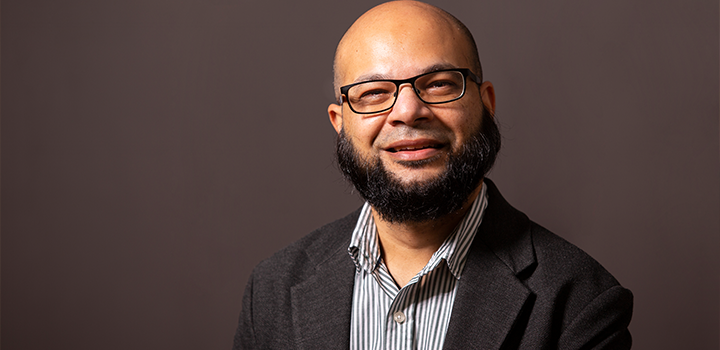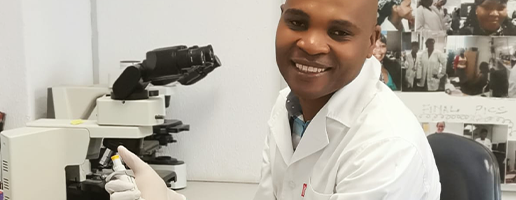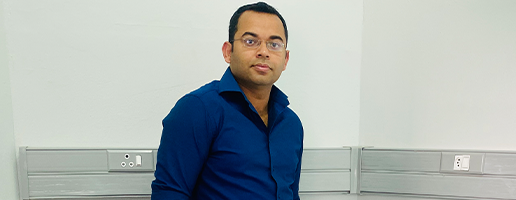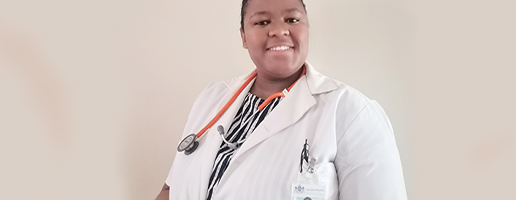Nephrology sub-specialisation: It was now or never

Dr Ismail Banderker had made a final decision: if his application to the Discovery Foundation Awards had been unsuccessful, he would see it as a sign that he shouldn't sub-specialise in nephrology. And then he received the good news.
It was while he was on pilgrimage that Dr Ismail Banderker's colleagues reminded him of the 2020 Discovery Foundation Awards' closing date. "I really had to scramble to get my application in on time on my return from Mecca," says the internal medicine consultant from Cape Town.
Dr Banderker is indeed a true Capetonian. Born in the city, he studied medicine at the University of Stellenbosch, and then did his internship at Tygerberg Hospital. He spent his community-service year at GF Jooste Hospital in Manenberg in the Cape Flats.
Doing the rounds in many Capetonian hospitals
"I really have done the rounds of the Cape Town hospitals," says Dr Banderker. He spent two more years at GF Jooste Hospital as a medical officer in the emergency centre, and then joined the Internal Medicine programme at the University of Cape Town and Groote Schuur Hospital. After that, he spent two years at Mitchells Plain Hospital, and four as an internal medicine consultant at New Somerset Hospital.
"Working in these hospitals has taught me life skills and also provided me with the opportunity to teach medical students, registrars, medical officers and nursing staff," he says. "I also had to liaise with allied health disciplines, and develop managerial skills to assist in running a department of medicine."
So, why become a nephrologist? "There is a shortage of nephrologists in South Africa, especially in the public health sector. At the same time, there is also a high incidence of kidney disease in South Africa. This is exacerbated by the increasing prevalence of non-communicable diseases, such as diabetes and heart disease. High blood pressure can also lead to the development of kidney disease," Dr Banderker explains.
One in three South Africans lives with high blood pressure, according to the Heart and Stroke Foundation of South Africa.
"Treating kidney disease requires high input from healthcare staff, as lots of work goes into dialysis sessions. Due to staff shortages and a shortage of equipment, not everyone can access treatment," he explains. "Doctors make these difficult decisions according to a strict criteria list, which takes things into account things such as age, comorbidities and body mass index," he adds.
He says the COVID-19 pandemic has put much pressure on nephrology departments, because patients are missing follow-up appointments and many outpatient services have been cancelled. There were also three foreign national staff members in the Nephrology Department at Groote Schuur who had to return to their countries of origin because of the lockdown.
Patient-to-nephrologist ratio is 'astronomical'
Once qualified, Dr Banderker says that he would like to bring back his skills and knowledge to the many communities around Cape Town where he has worked. He describes the ratio of patients with kidney conditions to nephrologists as 'astronomical'. If he could work as a nephrologist, it would lessen the burden on other specialists and he would be able to help more patients who are struggling to access nephrology services.
"It is not easy to get a post as a paid senior registrar. I've applied before and did not succeed. The Discovery Foundation offers me a chance to train while receiving a stipend as a monthly salary over two years. Without this, I doubt I would have been able to continue with this sub-specialisation. I had told myself this was going to be my last shot at it. And it worked," Dr Banderker says.
"I am grateful that God answered my prayer. And also, for the enormous support from the Discovery Foundation, my wife, my family, and everyone in the Nephrology Department at Groote Schuur Hospital," he concludes.
This article was created for the 2020 Discovery Foundation Awards and has been edited for the Discovery Magazine.
About the Discovery Foundation
Since 2006, the Discovery Foundation has invested over R256 million in grants to support academic medicine through research, development and training medical specialists in South Africa.
The Discovery Foundation is an independent trust with a clear focus - to strengthen the healthcare system - by making sure that more people have access to specialised healthcare services. Each year, the Discovery Foundation gives five different awards to outstanding individual and institutional awardees in the public healthcare sector.
Related articles

Imagine a test that could identify your risk of chronic kidney disease early
Patients with kidney conditions may never meet the doctor who could have the most impact on their health. Dr Siyabonga Khoza works behind the scenes in a laboratory and his research focuses on identifying the risk of chronic kidney disease sooner.

Double recognition for urologist and author, Dr Jeff John
Nothing in Dr Jeff John's life happens in singles. He comes from an extended family of doctors, he is working on his second book, and he was the only person in 2020 to receive both a Rural Individual and Institutional Award from the Discovery Foundation.

Testing patient knowledge in the fight against non-communicable diseases
Seven of the world's top 10 causes of death are non-communicable diseases, according to the WHO's 2019 Global Health Estimates. Discovery Foundation Award recipient Dr Zamanci September believes education is key to making South Africans healthier.